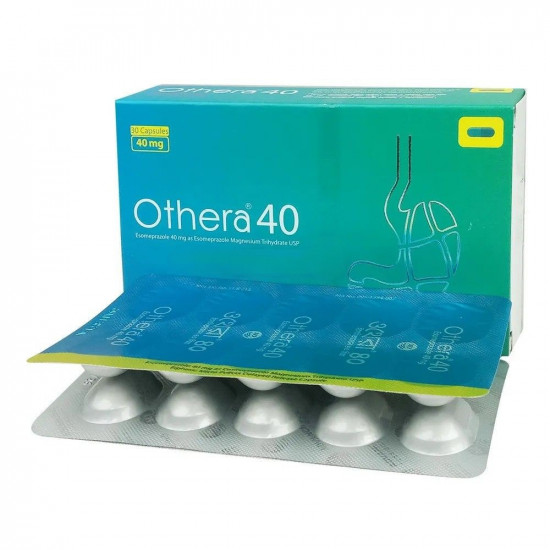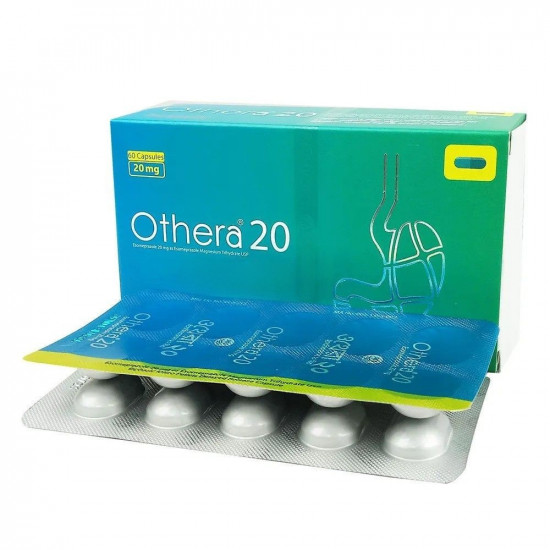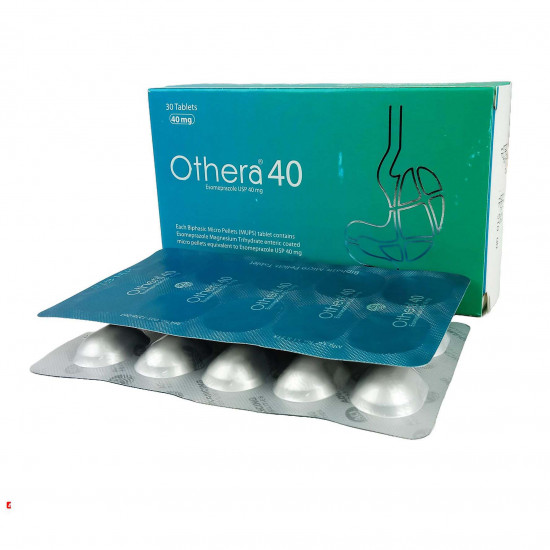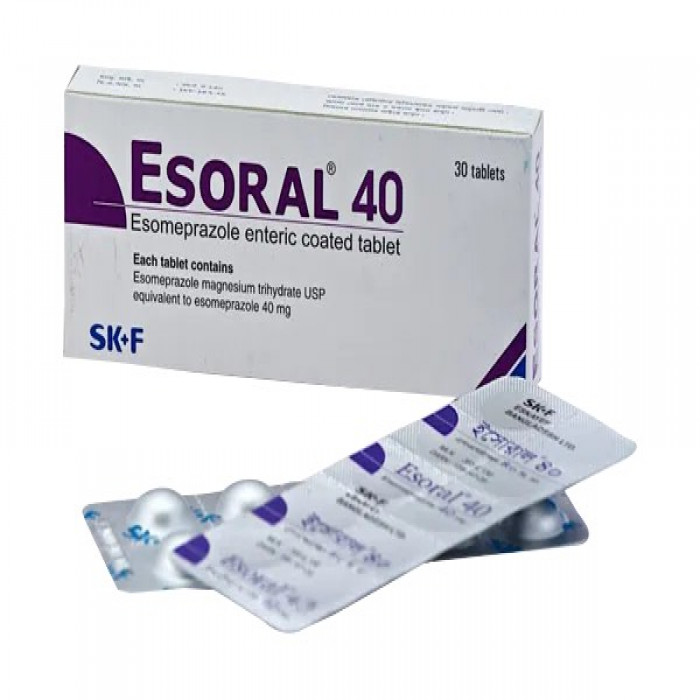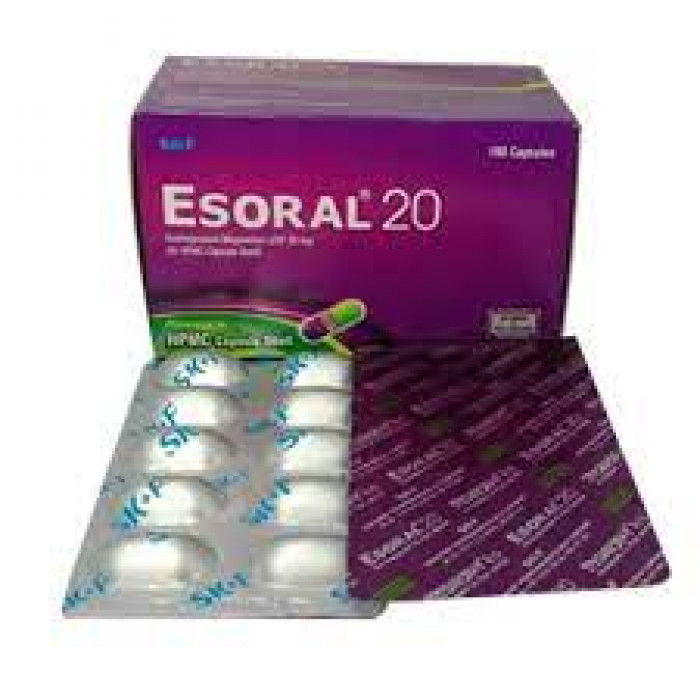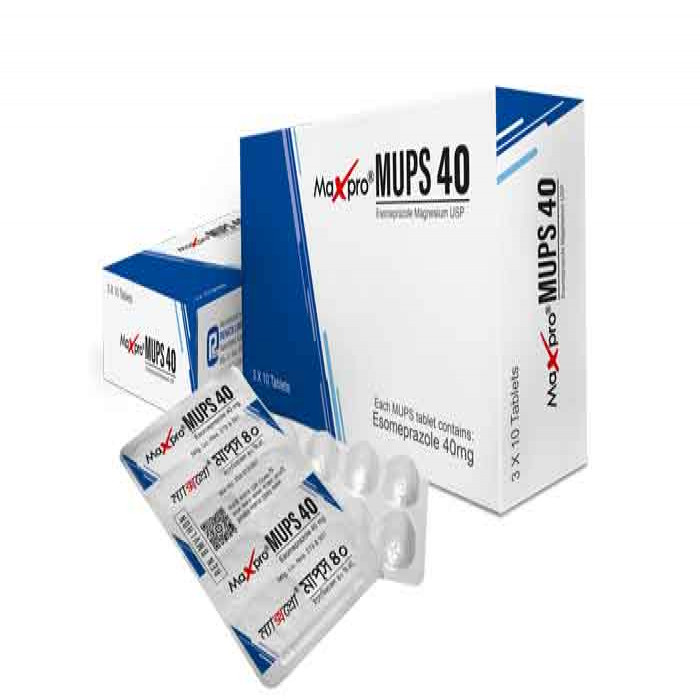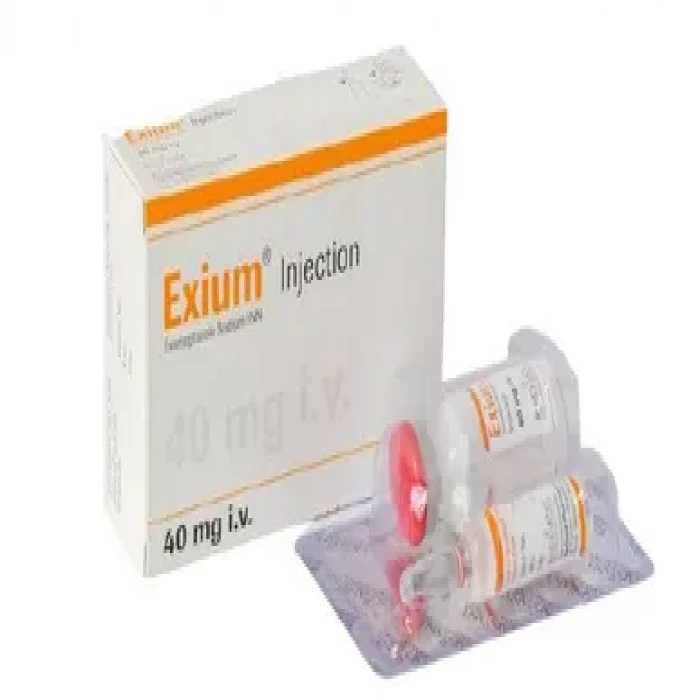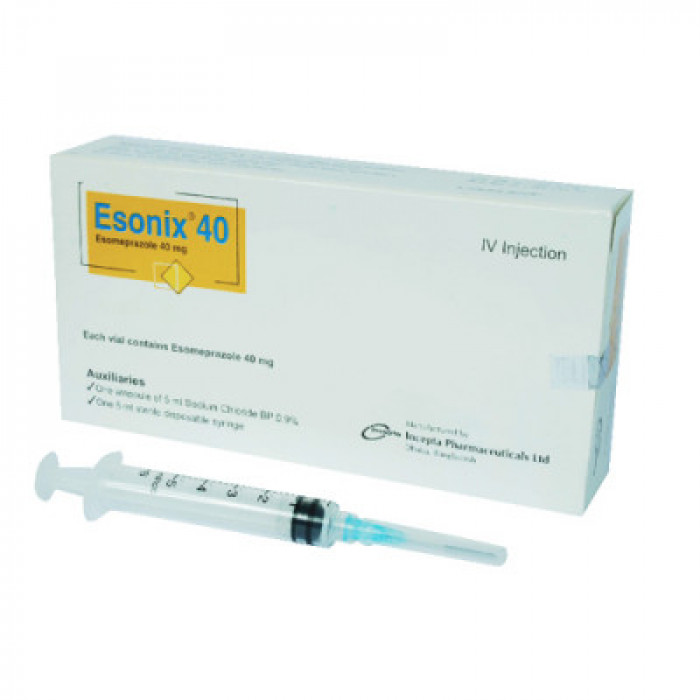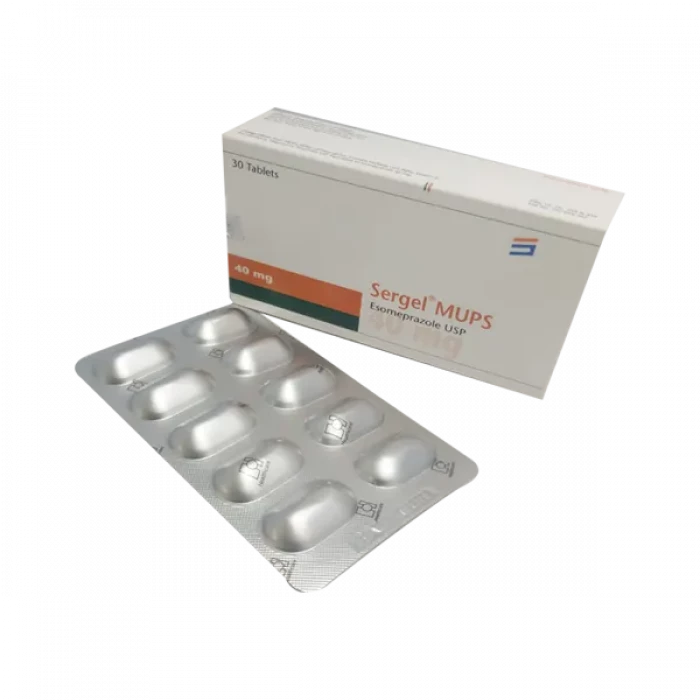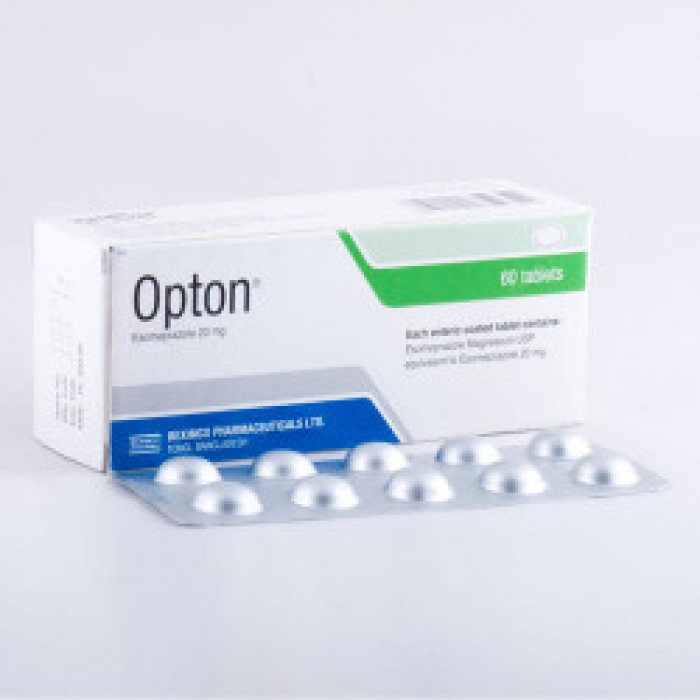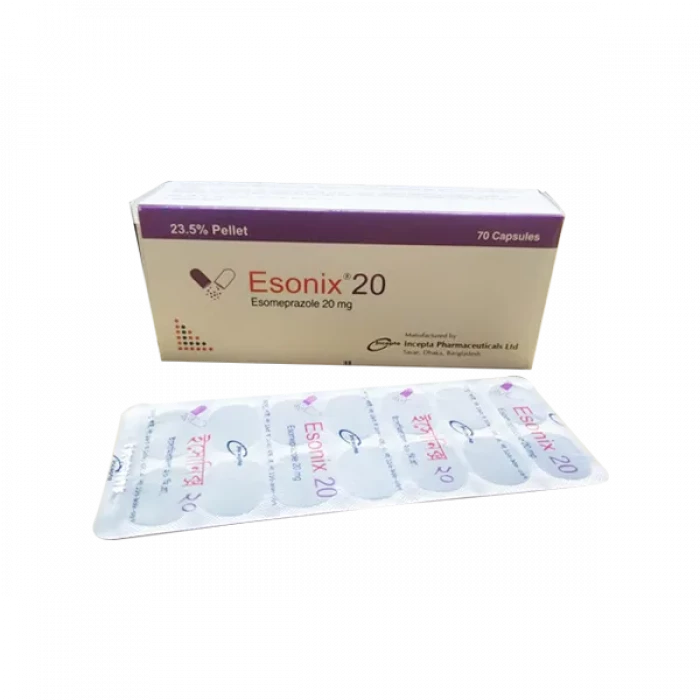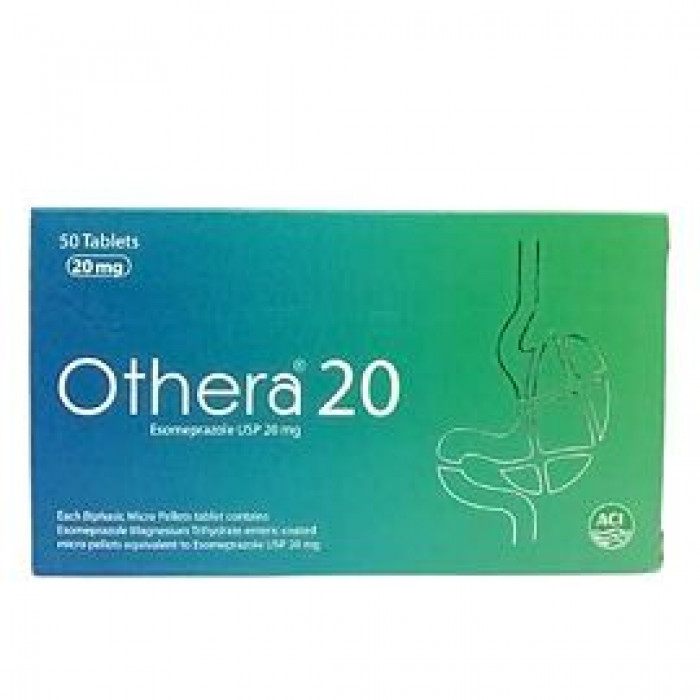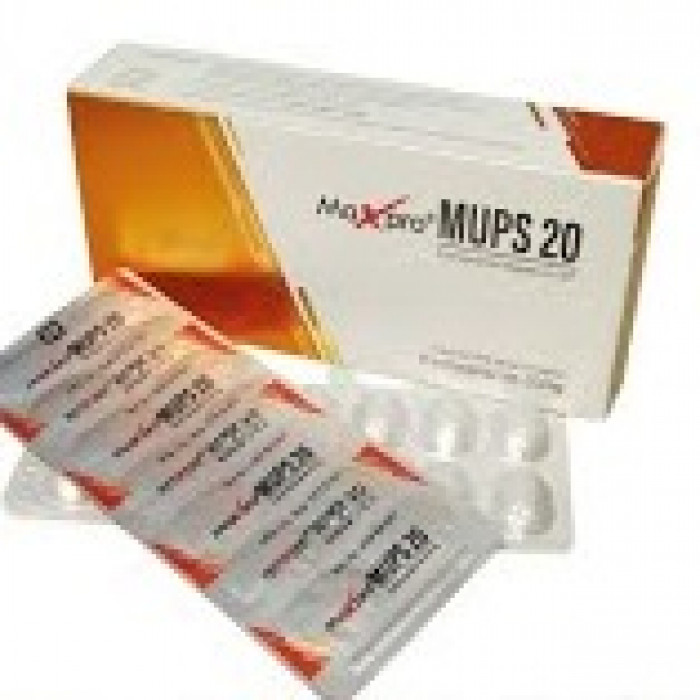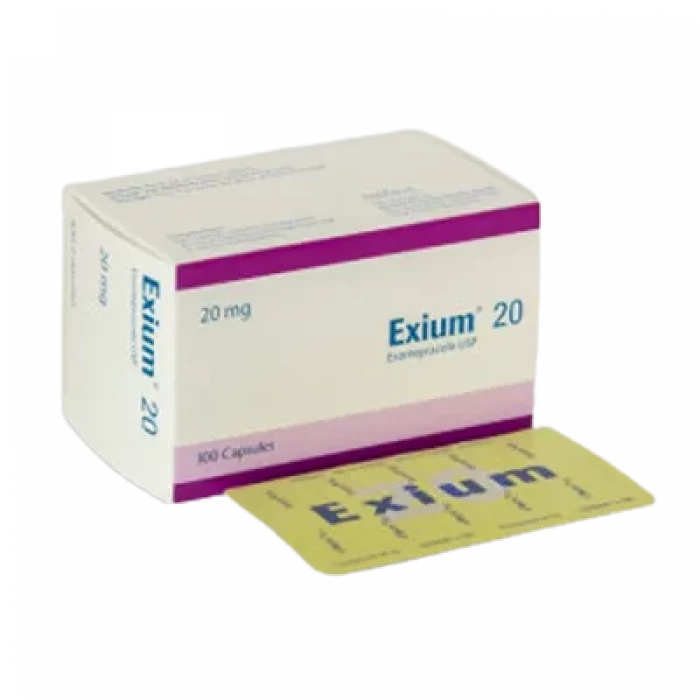
✔ 100% Authentic Product
👁️ Currently Viewing 6748
Exium 20mg Capsule
Exium 20mg Capsule is a medication that lessens the quantity of acid your stomach produces. Heartburn, acid reflux, and issues with your food pipe are all treated with it. Stomach ulcers can also be prevented and treated with Exium 20mg Capsule.
Discount
Price: ৳ 83
MRP:
৳
85.3
3%
Off

100% Genuine Products, Guaranteed

Safe & Secure Payments, Always

Fast, Secure & Efficient Delivery

Proper Packaging
 Cash on Delivery - All over Bangladesh
Cash on Delivery - All over Bangladesh Regular Delivery - 12-24 Hours, Dhaka City* Charge Tk.39-59
Regular Delivery - 12-24 Hours, Dhaka City* Charge Tk.39-59 Regular Delivery - 24-48 Hours, Other Cities* Charge Tk.99-110
Regular Delivery - 24-48 Hours, Other Cities* Charge Tk.99-110
 ফ্রি ডেলিভারিঃ - ৯৯৯ টাকা+ অর্ডারে, ঢাকা
শহরে
ফ্রি ডেলিভারিঃ - ৯৯৯ টাকা+ অর্ডারে, ঢাকা
শহরে ফ্রি ডেলিভারিঃ - ২৯৯৯ টাকা+ অর্ডারে, ঢাকার
বাহিরে
ফ্রি ডেলিভারিঃ - ২৯৯৯ টাকা+ অর্ডারে, ঢাকার
বাহিরে
100% Genuine Products, Guaranteed
Safe & Secure Payments, Always
Fast, Secure & Efficient Delivery
Proper Packaging
 Cash on Delivery - All over Bangladesh
Cash on Delivery - All over Bangladesh Regular Delivery - 12-24 Hours, Dhaka City* Charge Tk.39-59
Regular Delivery - 12-24 Hours, Dhaka City* Charge Tk.39-59 Regular Delivery - 24-48 Hours, Other Cities* Charge Tk.99-110
Regular Delivery - 24-48 Hours, Other Cities* Charge Tk.99-110 ফ্রি ডেলিভারিঃ - ৯৯৯ টাকা+ অর্ডারে, ঢাকা
শহরে
ফ্রি ডেলিভারিঃ - ৯৯৯ টাকা+ অর্ডারে, ঢাকা
শহরে ফ্রি ডেলিভারিঃ - ২৯৯৯ টাকা+ অর্ডারে, ঢাকার
বাহিরে
ফ্রি ডেলিভারিঃ - ২৯৯৯ টাকা+ অর্ডারে, ঢাকার
বাহিরে
✅ Description:
- Exium 20mg Capsule is used to treat peptic ulcers, esophagitis, gastroesophageal reflux disease (GERD), stress ulcers, and acidity caused by painkillers.
- It works by reducing the production of excess acid in the stomach.
- Some possible side effects of Exium 20mg Capsule include nausea, vomiting, headache, stomach pain, and diarrhea. If these side effects persist or worsen, it is recommended to consult your doctor.
- It is typically advised to take Exium 20mg Capsule one hour before a meal. It is important to take it at the same time every day to maintain a consistent level of the medication in your bloodstream.
- Do not stop taking Exium 20mg Capsule without consulting your doctor, as your symptoms may reappear. It is important to follow your doctor's instructions regarding the duration of treatment.
- If you are allergic to Exium 20mg Capsule or have liver or kidney problems, it is not recommended to use this medication. It is important to inform your doctor about any existing health conditions before starting the treatment.
- Inform your doctor about all the medications you are currently taking, as they can interact with Exium 20mg Capsule and reduce its effectiveness.
Safety Advices

Alcohol
UNSAFE
Although there is no known interaction with alcohol, drinking alcohol increases acidity further and may worsen issues related to the digestive system. Hence, alcohol should be avoided.

Pregnancy
CONSULT YOUR DOCTOR
Exium 20mg Capsule can be used during pregnancy. However, it should be used only under the recommendation of a doctor after assessing if this medicine is beneficial and will not harm the unborn child.

Breastfeeding
CONSULT YOUR DOCTOR
Exium 20mg Capsule should not be used by lactating mothers as it is not known if this medicine is passed into the breast milk and can have undesirable effects on the nursing infant.

Driving
CAUTION
Exium 20mg Capsule shows side effects like dizziness and blurred vision which can affect your driving ability. If you experience any such symptoms, do not drive.

Kidney
CAUTION
Exium 20mg capsules should be used with caution in patients with severe kidney problems. Consult your doctor before taking Exium 20mg Capsule.

Liver
CAUTION
Exium 20mg Capsules should be used with caution in patients with severe liver problems. Consult your doctor before taking Exium 20mg Capsule.
✔️ Uses of Exium 20mg Capsule
Treatment of -
- Gastroesophageal reflux disease (Acid reflux)
- Peptic ulcer disease
✔️ How does Exium 20mg Capsule work?
Exium 20mg Capsule belongs to a proton pump inhibitor that suppresses gastric acid secretion by specific inhibition of enzymes in the stomach cell. It hence reduces gastric acidity by blocking the final step in acid production and helps in the relief of acid-related indigestion and heartburn.
✔️ Side Effects of Exium 20mg Capsule
The following are the potential side effects associated with the use of Exium 20mg Capsule:
Common Side Effects:
- Headache
- Diarrhea
- Stomach pain
- Constipation
- Flatulence
- Nausea and vomiting
- Benign polyps in the stomach
Uncommon Side Effects:
- Swelling of the feet and ankles
- Troubled sleep
- Dizziness
- Tingling sensations
- Sleepiness
- Dry mouth
- Skin rash, hives, and itching
- Fracture of joints (such as hip, wrist, or spine)
Rare Side Effects:
- Weakness, bruising, or increased risk of infections due to a reduced number of white blood cells or platelets
- Low levels of sodium in the blood cause weakness, vomiting, and cramps
- Agitation, confusion, or depression
- Taste changes
- Blurred vision
- Wheezing and shortness of breath (bronchospasm)
- Oral inflammation
- Fungal infection affecting the gut (thrush)
- Yellowing of the skin, dark urine, and tiredness (liver problem)
- Hair loss (alopecia)
- Skin rash on exposure to sunlight
- Joint pain (arthralgia) or muscle pain (myalgia)
- Fatigue and a general feeling of being unwell
- Increased sweating
✔️ Quick Suggestions:
- It is recommended to use this medicine in the prescribed manner. However, anti-reflux medicines should preferably be taken in the morning on an empty stomach or with food for optimum effectiveness.
- You can make certain lifestyle modifications like preventing excess intake of foods that cause acidity, like carbonated drinks and oily/fried food, regular exercise, and maintaining a healthy weight.
- It is also advised to limit alcohol intake and quit smoking for better treatment of your acidity.
- It is advised to reduce stress and get good sleep each night.
- Inform your doctor if you are using this medicine as a continuous treatment of acidity for more than 4 weeks or if the symptoms are persistent even after taking the medicine.
- This medicine can hamper the actions of other medicines taken simultaneously. Inform your doctor if you are using any other medicines.
✔️ Indication of Exium 20mg Capsule
Exium 20mg Capsule is indicated:
- Treatment of Gastroesophageal Reflux Disease (GERD)
- Healing of erosive esophagitis
- Maintenance of healing of erosive esophagitis
- Symptomatic Gastroesophageal Reflux Disease (GERD)
- Reduction of NSAID-associated gastric ulcer
- Pylori eradication (Triple therapy)
- Zollinger-Ellison syndrome
✔️ Pharmacology
Esomeprazole is a proton pump inhibitor (PPI) that is commonly sold under the brand name Nexium. It works by selectively inhibiting the H+/K+ ATPase enzyme in the gastric parietal cells, which reduces the production of gastric acid in the stomach. Esomeprazole is the S-isomer of omeprazole, and it is the first single optical isomer of a proton pump inhibitor available on the market.
The S-isomer of esomeprazole provides improved acid control compared to racemic proton pump inhibitors, which contain both the S and R-isomers. This means that Esomeprazole 20 can effectively reduce the amount of gastric acid secreted by the stomach, providing relief for conditions such as peptic ulcers, gastroesophageal reflux disease (GERD), and other acid-related disorders.
As with any medication, Esomeprazole 20 may have potential side effects, although they are generally well-tolerated. Some common side effects may include headache, nausea, diarrhea, stomach pain, and flatulence. If these side effects persist or become bothersome, it is recommended to consult a healthcare professional.
✔️ Dosage & Administration of Exium 20mg Capsule
- Healing of Erosive Esophagitis:
- 20 mg or 40 mg once daily for 4-8 weeks.
- The majority of patients experience healing within 4 to 8 weeks.
- For patients who do not heal within this timeframe, an additional 4-8 weeks of treatment may be considered.
- Maintenance of Healing of Erosive Esophagitis:
- 20 mg once daily.
- Clinical studies did not extend beyond 6 months.
- Symptomatic GERD:
- 20 mg once daily for 4 weeks.
- If symptoms do not completely resolve after 4 weeks, an additional 4 weeks of treatment may be considered.
- Helicobacter pylori Eradication (Triple Therapy):
- Esomeprazole 40 mg once daily for 10 days.
- Amoxicillin 1000 mg twice daily for 10 days.
- Clarithromycin 500 mg twice daily for 10 days.
- This therapy is used to reduce the risk of duodenal ulcer recurrence.
- Zollinger-Ellison Syndrome:
- The dosage range is 20-80 mg once daily.
- The dose should be adjusted individually based on the patient's response.
- Treatment should be continued as long as clinically indicated.
- Acid-related Dyspepsia:
- 20-40 mg once daily for 2-4 weeks based on the response.
- Duodenal Ulcer:
- 20 mg once daily for 2-4 weeks.
- Gastric Ulcer:
- 20-40 mg once daily for 4-8 weeks.
It's important to note that these dosages are general guidelines, and individual patients may require different doses based on their specific condition and response to treatment. Always follow the instructions provided by your healthcare provider and consult them for personalized advice regarding your medication regimen.
✔️ Interaction
- Digoxin: There is an increased risk of digoxin-induced cardiotoxic effects when used concomitantly with Esomeprazole.
- Diuretics: Esomeprazole may increase the risk of hypomagnesemia when used with diuretics.
- Warfarin: Esomeprazole may increase the International Normalized Ratio (INR) and prothrombin time when used with warfarin.
- Tacrolimus, saquinavir, methotrexate: Esomeprazole may increase the serum concentrations of these drugs.
- CYP2C19 metabolized drugs: Esomeprazole may interfere with the elimination of drugs metabolized by CYP2C19, such as diazepam.
- Ketoconazole, erlotinib, iron salts: Esomeprazole may decrease the bioavailability of these drugs.
- Rilpivirine, atazanavir, nelfinavir: Esomeprazole may decrease the serum concentrations and pharmacological effects of these drugs.
- Clopidogrel: Esomeprazole may decrease the antiplatelet effects of clopidogrel.
Regarding Esomeprazole's own metabolism, it is extensively metabolized in the liver by CYP2C19 and CYP3A4 enzymes. In vitro and in vivo studies have indicated that Esomeprazole is not likely to inhibit CYPs 1A2, 2A6, 2C9, 2D6, 2E1, and 3A4. Therefore, no clinically relevant interactions with drugs metabolized by these CYP enzymes would be expected.
✔️ Contraindications
Esomeprazole is contraindicated in patients with known hypersensitivity to any component of the formulation or to substituted Benzimidazoles.
✔️ Pregnancy & Lactation
there are no adequate and well-controlled studies on the use of esomeprazole (Nexium) in pregnant women. Additionally, no teratogenic effects have been observed in animal studies. However, it is important to note that the safety of esomeprazole during pregnancy has not been conclusively established.
Regarding breastfeeding, the excretion of esomeprazole in breast milk has not been studied. Therefore, if the use of esomeprazole is deemed essential, it is recommended to discontinue breastfeeding. This precaution is taken to avoid potential risks to the nursing infant.
If you are pregnant or breastfeeding and have concerns about the use of esomeprazole, it is crucial to consult your healthcare provider. They can provide personalized advice taking into account your specific circumstances and help weigh the potential benefits and risks of the medication.
✔️ Precautions & Warnings
- Gastric Malignancy: It is important to note that symptomatic relief achieved with esomeprazole does not necessarily exclude the presence of gastric malignancy. If symptoms persist or worsen, further evaluation is recommended.
- Administration Instructions: Esomeprazole capsules should be taken at least one hour before meals. For patients who have difficulty swallowing the capsules, an alternative method involves opening the capsules and emptying the pellets onto a tablespoon of applesauce. The pellet and applesauce mixture should be swallowed immediately without chewing. The applesauce used should be soft and not hot.
- Pediatric Use, Pregnancy, and Lactation: Specific considerations and dosing information for pediatric patients, as well as the use of esomeprazole during pregnancy and lactation, may vary. It is important to consult with a healthcare professional for appropriate guidance and to weigh the potential risks and benefits.
- Malignancy and Hepatic Impairment: Esomeprazole should be used with caution in patients with malignancy or hepatic impairment. Close monitoring and appropriate dose adjustments may be necessary in these cases.
- Increased Risk of Infections: There may be an increased risk of developing certain infections, such as community-acquired pneumonia while taking esomeprazole. It is advisable to be cautious and seek medical attention if any signs of infection occur during treatment.
- Severe Liver Impairment: In patients with severe liver impairment, a maximum dose of 20 mg should not be exceeded. Dose adjustment and careful monitoring may be required in such cases.
- Lactation Risk: Esomeprazole is the S-isomer of omeprazole, and limited data suggest that omeprazole may be present in human milk. The effects of esomeprazole on breastfed infants or milk production are not well established. The decision to use esomeprazole in breastfeeding mothers should consider the potential benefits of breastfeeding and the clinical need for the medication. Consulting a healthcare professional is important to make an informed decision.
- Antacids: Antacids may be used while taking esomeprazole, but it is advisable to consult a healthcare professional for guidance on their appropriate use and timing in relation to esomeprazole administration.
✔️ Storage Conditions
- Store these tablets at room temperature.
- Store it in the original packaging to protect it from moisture.
- Please keep it away from children and pets.
⚠️Disclaimer:
At ePharma, we’re committed to providing accurate and accessible health information. However, all content is intended for informational purposes only and should not replace medical advice from a qualified physician. Please consult your healthcare provider for personalized guidance. We aim to support, not substitute, the doctor-patient relationship.





